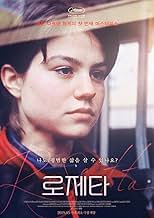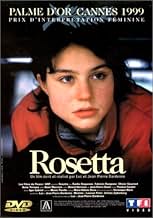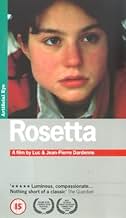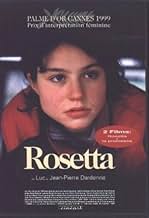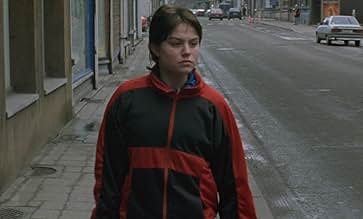AVALIAÇÃO DA IMDb
7,4/10
17 mil
SUA AVALIAÇÃO
A jovem e impulsiva Rosetta mora com a mãe alcoólatra. Movida pelo desespero, ela fará de tudo para manter um emprego.A jovem e impulsiva Rosetta mora com a mãe alcoólatra. Movida pelo desespero, ela fará de tudo para manter um emprego.A jovem e impulsiva Rosetta mora com a mãe alcoólatra. Movida pelo desespero, ela fará de tudo para manter um emprego.
- Direção
- Roteiristas
- Artistas
- Prêmios
- 10 vitórias e 7 indicações no total
Leon Michaux
- First Policeman
- (as Léon Michaux)
- Direção
- Roteiristas
- Elenco e equipe completos
- Produção, bilheteria e muito mais no IMDbPro
Avaliações em destaque
10MikeF-6
This small Belgian film was the unexpected winner of the Palme d'Or at Cannes during the year when David Cronenberg and his panel of contrarians ruled. Because other, more popular films ("All About My Mother," "L'Humanité," "The Straight Story") were passed over, "Rosetta" has received a reputation as an undeserved winner. I am here to proclaim it a great film and a worthy addition to anyone's Best list. I have not researched whether or not the director of "Rosetta" set out adhere to Dogma 93 principles, but many of them are present no movie makeup, natural light, natural locations, no soundtrack music, and hand held cameras. The camera follows one person the title character so that just about every shot is either of her or from her point of view. Rosetta lives with her alcoholic prostitute mother in a camping trailer at a run down campground called The Grand Canyon. She is in her late teens, doesn't have any friends (except one she meets during the course of the story) or even communicates much with other people, and is only interested in getting a regular job and living a normal life. In a remarkable episode, we see her in bed just before going to sleep. She is having a conversation with herself that goes, "You have a job. I have a job. You have a friend. I have a friend. You have a normal life. I have a normal life. Good night. Good night." Rosetta is played by Émilie Dequenne (who won Best Actress at Cannes). She is so good, so natural, so much *Rosetta* that, along with the photographic technique, she gives the material a documentary feel. One reviewer even called her a "non-actor" as if she were not a professional actress (this is her first movie role) and had been picked right out of that campground to play her own life. The film goes by quickly even as the plot unfolds slowly. We follow Rosetta as she travels her city by foot and bus looking for work, catching fish to eat from an urban river, and tentatively letting one other person into her routines. Sometimes character motivation may seem murky, but it is a thrill, later, when you realize what was really going on. If I remember correctly, there is only one brief dialog exchange near the end where one person explains plot points to another for the audience's benefit. The ending is a tender moment that may indicate a new stage in Rosetta growth. Highly recommended. A beautiful and deeply felt film.
I saw "Rosetta" several weeks ago - and I still fail to recall any movie which could convey such an immediate sense of being pysically there, all the time along Rosetta's everydays' "war". We are bombarded and flooded with images 16hours per day, it takes great stregth of vision, of images, atmosphere and characters to grab at you this effectively in year 2000! Rosetta struck my as a very real encounter, with all the nonsense and ups / down of real events and life... It made me feel more of life, made me think of it more often and more intensely, it made me look into more eyes than I did before... Thank you, Luc and Jean-Pierre! and thank you, Emilie and all!
This film relies mainly on one camera to capture every little action and detail of the lead character, Rosetta, especially in her reactions to the despair she suffers throughout the film. I caught this one on IFC on May 23rd. The acting is so realistic, it is hard to imagine that the story is fictional and is shot in a documentary type style, where the hand held camera follows the actors, sneaks glimpses of their world in much the same way an ENG crew would on a story about poverty in a small European town where the economy is so bad there is little one can do to survive outside of desperate acts. In this case, Rosetta, the young girl with an alcoholic mother, lives in a trailer with no heat, has to sell re-sewn clothes to make a meager existence until she finally sees an opportunity open up for a job selling waffles at a small stand in a high traffic part of town. A young man who works there is smitten with her and offers to split some earnings from selling waffles he makes outside of his boss's knowledge. To tell you what happens next would give away the rest, but suffice to say this film is bitterly realistic, terribly sad and the ending is rather sudden but it shows some promise for the characters. The movie is shot with almost no budget, but some great camera work, some scenes a little long but edited fairly well, no music, and subtitles under the French dialog. It deserves awards for telling a very credible story demonstrating hardship of the poor in Europe and what measures one has to take to survive. I was deeply moved and driven to weep during painful scenes of the lead character's despair and what seems to be a hopeless situation. The character is genuinely portrayed by a young actress from Belgium performing extremely well for her first film role. Fine work by director and cast.
I saw Rosetta 3 or 4 months ago and it has stayed vividly in my mind. I would like to respond to two other commentaries here which compare Rosetta to earlier films.
One commentary compares it to Nights of Cabiria. But this is no pastoral fantasy like the Fellini. Another contributor calls Rosetta a fake Bresson. Presumably the point of comparison is with Bresson's Mouchette, and it's a good comparison to make, but I don't think it is one that diminishes Rosetta. Both Mouchette and Rosetta capture the flow of time and the characters' interior worlds realistically, but with realisms which are quite different. Mouchette's struggle is a spiritual one; Rosetta's struggle is with her physical conditions.
To make a comparison of my own, albeit an off-the-wall one, Rosetta's determination is strangely like the pure will-power that Lee Marvin demonstrates, barging into the Organisation's HQ in Point Blank. Maybe this forceful quality is what makes it a "war film".
The film-makers do the opposite of sentimentalising Rosetta's conditions as Fellini would have done. Arguably, they even go past Bresson, if you tend to a materialist rather than a religious point of view. They argue how poverty operates, how surviving it involves anger.
There is one moment when Rosetta slips in a lake and we understand exactly at the moment she does, that she may in fact drown. Not a moment that's easy to forget.
One commentary compares it to Nights of Cabiria. But this is no pastoral fantasy like the Fellini. Another contributor calls Rosetta a fake Bresson. Presumably the point of comparison is with Bresson's Mouchette, and it's a good comparison to make, but I don't think it is one that diminishes Rosetta. Both Mouchette and Rosetta capture the flow of time and the characters' interior worlds realistically, but with realisms which are quite different. Mouchette's struggle is a spiritual one; Rosetta's struggle is with her physical conditions.
To make a comparison of my own, albeit an off-the-wall one, Rosetta's determination is strangely like the pure will-power that Lee Marvin demonstrates, barging into the Organisation's HQ in Point Blank. Maybe this forceful quality is what makes it a "war film".
The film-makers do the opposite of sentimentalising Rosetta's conditions as Fellini would have done. Arguably, they even go past Bresson, if you tend to a materialist rather than a religious point of view. They argue how poverty operates, how surviving it involves anger.
There is one moment when Rosetta slips in a lake and we understand exactly at the moment she does, that she may in fact drown. Not a moment that's easy to forget.
This is beyond the intensity of Gary Oldman's "Nil By Mouth", and Tim Roth's "The War Zone", while Erick Zonca's "Dreamlife of Angels" seems heavenly compared to the conditions presented in "Rosetta" by Luc and Jean-Pierre Dardenne.
A down right harsh film. Unsparingly direct depiction of a young girl's poverty struggle. She is as tough as she can be. She fights vigorously to hang on to a job. She cares for her mother, a helpless alcoholic, and a seamstress when not drunk. Rosetta (Emilie Dequenne) is unrelentingly stubborn about receiving kindness, or food unsolicited. She has her dignity. A young person with so much burden on her shoulder and a heavy heart.
Things may be seemingly repetitive: again and again we see her crossing that traffic roadway, jumping into the bush trail; we hear the rustling leaves, the thumping of her footsteps; we watch her stopping by the hideout where she kept her rubber boots, changing her only good pair of working shoes; we follow her as she crawls through the wire fence loophole, arriving at the campers -- feels like a mindless routine. Yet, she's intensely single-minded on getting "a real job" (vs. moonlighting) and to have "a normal life", not to "fell into a rut". At one point, we can almost be happy for her to have "found a friend" in Riquet (Fabrizio Rongione), a waffle street van vendor. She actually was able to peacefully sleep that night. Only to wake up and report at work to be told she's again out of a job. A devastating blow. Out of desperation, she did something that most of us viewers may not be able to comprehend -- but what do we know of her travails, who are we to judge her action?
It was not easy for her to have done what she did -- she did hesitate and took the risk. She risked her newfound friendship -- she desperately needed "to have a job". In a way, she has lack tenderness, love and warmth for so long that she's numb to human kindness -- she needs to be thawed! One has to be patient with her, to give her time and see through her tough surface and rekindle her heart. Trust needs to be rebuilt for her to continue living and tackle difficulties afresh!
This is no Hollywood fare. Dialogs are few. No exploitative, explosive, abusive scenes. We're given the bare structure of the story, and Rosetta, plus the sparing few supporting characters, held the movie steadily intact.
A down right harsh film. Unsparingly direct depiction of a young girl's poverty struggle. She is as tough as she can be. She fights vigorously to hang on to a job. She cares for her mother, a helpless alcoholic, and a seamstress when not drunk. Rosetta (Emilie Dequenne) is unrelentingly stubborn about receiving kindness, or food unsolicited. She has her dignity. A young person with so much burden on her shoulder and a heavy heart.
Things may be seemingly repetitive: again and again we see her crossing that traffic roadway, jumping into the bush trail; we hear the rustling leaves, the thumping of her footsteps; we watch her stopping by the hideout where she kept her rubber boots, changing her only good pair of working shoes; we follow her as she crawls through the wire fence loophole, arriving at the campers -- feels like a mindless routine. Yet, she's intensely single-minded on getting "a real job" (vs. moonlighting) and to have "a normal life", not to "fell into a rut". At one point, we can almost be happy for her to have "found a friend" in Riquet (Fabrizio Rongione), a waffle street van vendor. She actually was able to peacefully sleep that night. Only to wake up and report at work to be told she's again out of a job. A devastating blow. Out of desperation, she did something that most of us viewers may not be able to comprehend -- but what do we know of her travails, who are we to judge her action?
It was not easy for her to have done what she did -- she did hesitate and took the risk. She risked her newfound friendship -- she desperately needed "to have a job". In a way, she has lack tenderness, love and warmth for so long that she's numb to human kindness -- she needs to be thawed! One has to be patient with her, to give her time and see through her tough surface and rekindle her heart. Trust needs to be rebuilt for her to continue living and tackle difficulties afresh!
This is no Hollywood fare. Dialogs are few. No exploitative, explosive, abusive scenes. We're given the bare structure of the story, and Rosetta, plus the sparing few supporting characters, held the movie steadily intact.
Você sabia?
- CuriosidadesContrary to popular belief, the film did not inspire a new so-called "Rosetta Law" in Belgium that prohibited employers from paying teen workers less than the minimum wage and included other youth labour reforms. In a Guardian interview with the Dardenne brothers, Jean-Pierre explained the misconception: "No, that law already existed, it just hadn't been voted through yet. The truth is always less interesting than the fiction."
- Erros de gravaçãoWhen Rosetta is giving her mother money for a water bill she is wearing a jacket with the sleeves fully extended. However in the next immediate cut when she goes outside the sleeves are rolled up.
- Trilhas sonorasSomething New
Principais escolhas
Faça login para avaliar e ver a lista de recomendações personalizadas
- How long is Rosetta?Fornecido pela Alexa
Detalhes
- Data de lançamento
- Países de origem
- Central de atendimento oficial
- Idioma
- Também conhecido como
- Розетта
- Locações de filme
- Empresas de produção
- Consulte mais créditos da empresa na IMDbPro
Bilheteria
- Faturamento bruto nos EUA e Canadá
- US$ 266.665
- Fim de semana de estreia nos EUA e Canadá
- US$ 20.187
- 7 de nov. de 1999
- Faturamento bruto mundial
- US$ 293.092
Contribua para esta página
Sugerir uma alteração ou adicionar conteúdo ausente


![Assistir a Bande-annonce [OV]](https://m.media-amazon.com/images/M/MV5BOWY4MGMzYTItZjQwOS00MmVhLWE0MDYtMGZmYmFjNTkyYTU2XkEyXkFqcGdeQXRyYW5zY29kZS13b3JrZmxvdw@@._V1_QL75_UX500_CR0)


